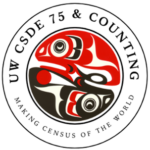From Human Ecology to Social Ties to Assimilation: The Legacy of Pete Guest – Susan Brown
|
When: Friday, October 17, 12:30 pm
Where: Parrington Hall Room 360 and on Zoom
1-on-1 meetings: 223 Raitt Hall (sign up here)
We are looking forward to hosting UW Alumna Susan Brown from The University of California, Irvine on Friday, October 17 in Parrington Hall 360 and on Zoom. Dr. Brown will deliver the The Guest Lecture, in honor of Pete Guest, titled “From Human Ecology to Social Ties to Assimilation.”
Avery M. “Pete” Guest was one of the last giants of the traditional field of human ecology. His interests ranged from neighborhood persistence to social ties, to the structure and social importance of suburbanization, to assimilation, and more, with a strong historical bent. While his students have taken his interests in multiple directions, Brown will focus on how Pete Guest influenced her work in the field of immigrant integration, with a focus on traditional structural and spatial integration and ultimately on legal status and other types of restrictions to social inclusion.
(read more)
|
 |
|
|
Pleasure and Lindberg Awarded Funding for Research on Contraception Misinformation from the Society of Family Planning
|
CSDE Trainee Zoe H. Pleasure (Health Services) and CSDE External Affiliate Laura Lindberg (Rutgers) have been awarded research funding from the Society of Family Planning to study contraception misinformation. Pleasure and Lindberg will explore how contraceptive misinformation affects contraceptive health outcomes for gender-diverse young people in the U.S. through a nationally representative survey and qualitative interviews. This project builds on a seed grant funded through CSDE. Pleasure also received funding for a second project, with co-PI Asha Hassan (Minnesota), which will involve conducting qualitative interviews with individuals with chronic conditions to provide insight into how they interact with and navigate the complex information ecosystems related to contraception and chronic illness.
(read more)
|
 |
Bostrom Publishes Article on Scientists’ Mental Models of Microplastics
|
CSDE Affiliate Ann Bostrom and an international, interdisciplinary team of co-authors recently published “Scientists’ mental models of microplastics: insights into expert perceptions from an exploratory comparison of research methods” in the journal, Microplastics and Nanoplastics. The article presents results from two complementary studies of the causal beliefs—that is, the “mental models”—microplastic scientists hold related to the risks of microplastics in freshwater systems, an emerging global environmental problem. Study 1 examined core concepts in their mental models from a decision analysis perspective. In Study 2, microplastics scientists used a visual mental mapping tool (the M-Tool) to draw causal connections between core ideas about microplastics. Across both studies, scientists emphasized household consumption of plastics as a direct and indirect source of microplastics, but there were gaps in how they talked about dose–response functions.
(read more)
|
 |
Tom Publishes Article on Religion and Racial Bias in Artificial Intelligence Large Language Models
|
CSDE External Affiliate Joshua Tom (Seattle Pacific) and co-authors recently published an article titled, “Religion and Racial Bias in Artificial Intelligence Large Language Models” in Socius. Tom and co-authors examine if LLMs hold implicit assumptions with regard to religious identities by prompting LLMs to generate religious sermons, specifying different combinations of race and religious tradition of the clergyperson. Evangelical Protestant pastors had easier to read AI–generated sermons, whereas Jewish rabbis and Muslim imams had more difficult to read synthetic texts.
(read more)
|
 |
Martin Co-authors Opinion Piece on Youth Prisons in The Imprint
Dunbar Publishes on Development and Protocols of the Brain Health Study (BHS)
|
CSDE Research Scientist Matthew D. Dunbar, PhD, and co-authors recently published an article in Alzheimer’s & Dementia, titled “The companion dog as a translational model for Alzheimer’s disease: Development of a longitudinal research platform and post mortem protocols.” The authors describe the objectives, infrastructure, platform development, and protocol of the Brain Health Study (BHS). The BHS aims to establish the role of privately owned companion dogs as a translational model for Alzheimer’s Disease research.
Why dogs? Companion dogs share genetic diversity, environmental exposures, and cognitive traits with humans. Their condensed lifespans and human-like aging patterns make them an ideal model for understanding cognitive decline. The study’s research infrastructure is in place for longitudinal data collection, annual biospecimen collection and postmortem sample collection, with 500 dogs enrolled and 21 postmortem specimens already collected.
(read more)
|
 |
|
|
CSDE Science Core – Upcoming Workshops
|
Each quarter, CSDE offers 3-5 workshops on data sources, statistical and biomarker methodology, introductions to analysis programs, and more, all given by CSDE staff and faculty affiliates. These workshops can include hands-on training in novel methods and programming, lectures on innovative data sources, and discussions of important issues in research and data collection.
(read more)
|
 |
Advocating For the Value of Your Favorite Federal Dataset
|
If you have a data set that is really important for you and has valuable impact more generally, then consider telling your story to Essential Data U.S. (https://essentialdata.us/). They are seeking to build a compendium of cases that convey compelling real-world examples of how federal data can benefit the American people and economy. Your story will help data users and advocates be more effective when engaging with lawmakers and federal agencies for continued resourcing of federal data programs.
(read more)
|
 |
Resource for Narrative and Computation Text Analysis on Migration and Citizenship
|
The Centre for Migration Studies at University of British Columbia has just posted materials from a September conference on Narrative and Computational Text Analysis for research on migration and citizenship. The materials are relevant to anyone who is relatively new to computation text analysis and curious to learn more. You can download the materials from the workshop here.
(read more)
|
 |
IPUMS Updates on Data
PSU Resource for Finding Federal Data During Shutdown
*New* Join the Mobility and Migration Modeling Intercomparison Project (3MIP)
|
The Mobility and Migration Modeling Intercomparison Project (3MIP) invites you to join a new initiative to advance the modeling of migration and mobility in the context of climate change.
Over the past decades, migration modeling capacity has expanded considerably, with diverse approaches including ABM, IAM, Gravity, Radiation, and others. Similar to how model intercomparison projects (MIPs) such as AgMIP and ISIMIP have strengthened agricultural and climate modeling, 3MIP aims to improve the robustness, comparability, and usability of migration models. By standardizing methods, characterizing uncertainties, and setting shared benchmarks, we hope to build a foundation for stronger science and policy applications.
(read more)
|
 |
Share UW Undergraduate Research Opportunities on the Office of Undergraduate Research’s Research Opportunities Database
|
Are you wondering how to advertise research opportunities to UW undergraduates? You can promote undergraduate research opportunities on the UW Office of Undergraduate Research’s Research Opportunities Database. Please take a moment and fill out a brief form in which you will be asked to describe a defined project or research area that an undergraduate could participate in.
Do you want to learn more about mentorship? RSVP today for special offerings for research mentors starting October 9.
(read more)
|
 |
Register Now: CUGH Virtual Symposium on the Triple Environmental Crisis (10/14/25)
|
Join the Consortium of Universities for Global Health for this engaging symposium where they will exchange ideas and explore solutions to combat the pressing challenges of climate change, pollution, and biodiversity loss, which pose significant risks to our health and security. Register here and visit their website for more information.
(read more)
|
 |
Virtual Dialogues on Planned Relocation in the Context of Disasters and Climate Change (10/16/2025 – 10/17/2025)
Berlin Demography Days 2025: Demography and Democracy (10/27/25 – 10/28/25)
|
The electoral successes of anti-democratic movements cannot be explained solely by the demographic or socio-economic characteristics of individual groups. More decisive are local perceptions of problems and narratives of loss in the context of demographic change. These manifest in a perceived political overload, blame and the supposed failure of ‘established’ politics.
(read more)
|
 |
*New* Engaging the Oublic: Training Offered for UW Researchers (11/01/25)
Call for LOIs from the Washington LHS E-STAR Center (11/10/25)
|
The third Call for Letters of Interest (LOI) for a training opportunity at the Washington Learning Health System Embedded Scientist Training and Research (LHS E-STAR) Center. This third and final round of scholars will conduct research projects at Community Health Association of Spokane and HealthPoint. Learn more about the E-STAR Center on their website.
We encourage you to share the instructions for the LOI with early career faculty and postdocs who may be interested in this exciting opportunity.
(read more)
|
 |
Wittgenstein Centre Conference 2025: Demographic Perspectives on Migration in the 21st Century (11/19/25 – 11/21/25)
|
The conference will be held in hybrid format.
Migration is a highly debated yet divisive topic in today’s public and policy discourse. In low fertility societies, migration is the main driver of population change and is essential for maintaining a stable labour force. Although it is often presented in simplistic terms, migration is a complex phenomenon shaped by the interplay of multiple drivers and barriers.
(read more)
|
 |
UW REACH Implementation and Evaluation Fellowship (11/28/25)
|
The University of Washington Research and Engagement on Adaptation for Climate and Health (REACH) Center is accepting applications to the Implementation and Evaluation Fellowship until November 28. The Fellowship provides teams of fellows with $60,000 of funding and training to conduct an implementation science project to evaluate or improve the uptake of a climate and health-related project or program.
Fellows apply and participate as teams of 2-3 public health or healthcare practitioners and researchers.
(read more)
|
 |
Finding NASA’s Data from Socioeconomic Data and Applications Center (SEDAC) – Moved to Harvard
Volunteer Researchers Needed for Community-Based Participatory Research
|
Dr. Melanie Martin is looking for a graduate student collaborator(s) to help with a year-long community-based participatory research project based in a local Lake City elementary school to study the impacts of culturally sustaining and asset-based pedagogical approaches in early education.
(read more)
|
 |
Data Resource: Dewey Data
|
Dewey Data is a research platform that provides access to third-party datasets across a variety of data categories including foot traffic, construction permits, healthcare, workforce, consumer behavior, and transportation.
University of Washington faculty, students, and researchers are eligible for access and must register an individual account. Follow this link to learn about how to register.
(read more)
|
 |
Sign Up to Join the Early Career Listserv!
|
We invite early career faculty affiliates to join our new mailing list, csde_earlycareer. Among other things, this is the way to find out info about our quarterly Early Career Affiliate happy hours, and you won’t want to miss those! These will be a great way to meet up with other junior scholars in a fun and casual atmosphere over snacks and drinks.
(read more)
|
 |
|
|

